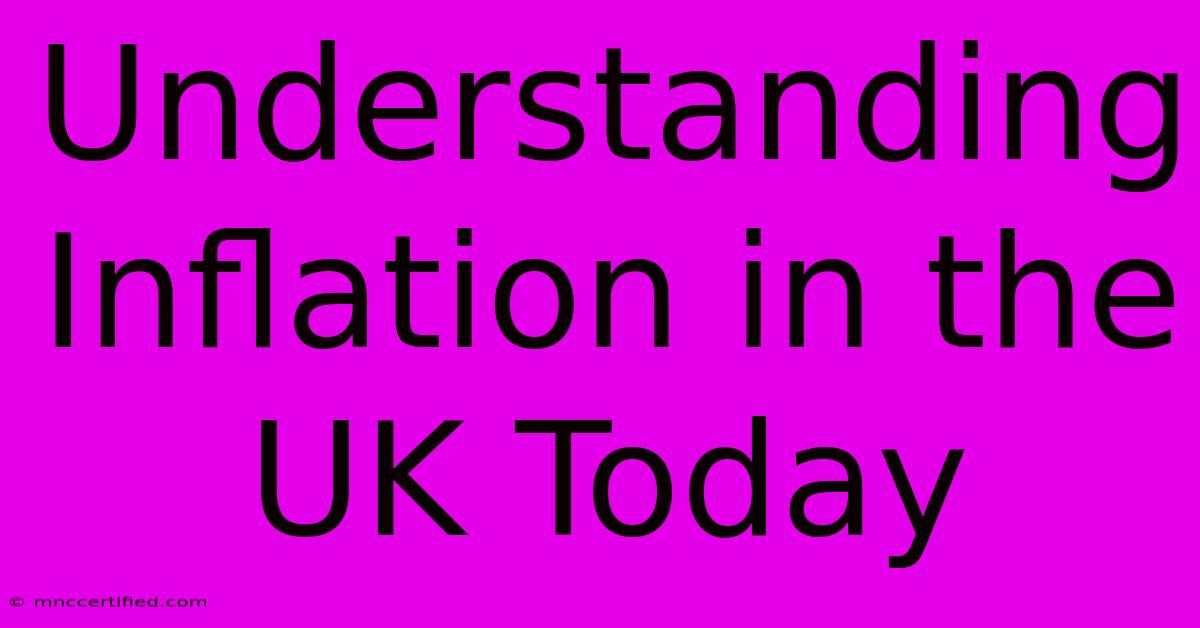Understanding Inflation In The UK Today

Table of Contents
Understanding Inflation in the UK Today: A Comprehensive Guide
The UK, like many countries globally, is grappling with inflation. Understanding its causes, effects, and potential solutions is crucial for individuals and businesses alike. This article provides a comprehensive overview of inflation in the UK today, exploring its drivers, impacts, and the government's response.
What is Inflation?
Inflation refers to a sustained increase in the general price level of goods and services in an economy over a period of time. When the price level rises, each unit of currency buys fewer goods and services. Consequently, inflation reflects a reduction in the purchasing power per unit of money – a loss of real value in the medium of exchange and unit of account within the economy. In simple terms, your money buys less than it did before.
The UK uses the Consumer Price Index (CPI) and the Retail Price Index (RPI) to measure inflation. CPI is the most commonly used measure and excludes housing costs, while RPI includes them. Understanding the difference is important, as these figures can vary.
Causes of UK Inflation
Several factors contribute to the current inflationary pressures in the UK:
1. Supply Chain Disruptions:
The COVID-19 pandemic severely disrupted global supply chains, leading to shortages of goods and increased transportation costs. This directly impacted the price of many products in the UK.
2. Energy Price Shocks:
The war in Ukraine significantly impacted global energy prices, particularly natural gas. This resulted in a sharp increase in energy bills for UK households and businesses, fueling inflation.
3. Increased Demand:
Post-pandemic, pent-up demand combined with government stimulus measures led to increased consumer spending, putting upward pressure on prices.
4. Wage Growth:
While wage growth has been present, it hasn't kept pace with inflation in many sectors. This has created a wage-price spiral, where rising wages further fuel price increases.
5. Brexit:
Brexit has also played a role, impacting trade relationships and increasing import costs for certain goods. The added bureaucratic hurdles and trade barriers have contributed to inflationary pressures.
Impact of Inflation on the UK
High inflation negatively impacts various aspects of the UK economy:
1. Reduced Purchasing Power:
The most direct impact is the erosion of purchasing power. People's incomes don't stretch as far, leading to reduced consumption and a lower standard of living.
2. Increased Interest Rates:
To combat inflation, the Bank of England (BoE) typically increases interest rates. Higher interest rates make borrowing more expensive, impacting businesses and consumers alike. This can slow economic growth.
3. Uncertainty and Investment:
High inflation creates economic uncertainty, discouraging investment and hindering long-term economic growth. Businesses become hesitant to invest in expansion or new projects.
4. Social Inequality:
Inflation disproportionately affects low-income households who spend a larger proportion of their income on essentials like food and energy.
Government Response to Inflation
The UK government and the Bank of England are employing various strategies to tackle inflation:
- Monetary Policy: The BoE's primary tool is raising interest rates to cool down the economy and reduce demand.
- Fiscal Policy: The government can use fiscal measures like tax cuts or increased government spending to stimulate or dampen the economy, depending on the situation. However, fiscal policy has limitations in directly controlling inflation.
- Targeted Support: The government has introduced various schemes to provide targeted support to vulnerable households struggling with rising energy costs.
Looking Ahead: Managing Inflation in the UK
Controlling inflation is a complex process with no quick fixes. The success of the current strategies depends on various factors, including the global economic climate and the effectiveness of government policies. Ongoing monitoring and adaptation of policies will be crucial in managing inflation and ensuring a stable economic future for the UK. The long-term effects of the current inflationary period are still unfolding, and careful observation and proactive policy adjustments are vital.
Keywords: UK inflation, inflation UK, consumer price index CPI, retail price index RPI, Bank of England, interest rates, supply chain, energy prices, Brexit, purchasing power, economic growth, government policy, monetary policy, fiscal policy.

Thank you for visiting our website wich cover about Understanding Inflation In The UK Today. We hope the information provided has been useful to you. Feel free to contact us if you have any questions or need further assistance. See you next time and dont miss to bookmark.
Featured Posts
-
Juventus Mottas Versatile Star Plans
Dec 18, 2024
-
Kamaka Air Crash Leading Up To Tragedy
Dec 18, 2024
-
Coppa Italia Juventus Cagliari Match Thread
Dec 18, 2024
-
Brits 107 M Lottery Win Life After
Dec 18, 2024
-
Bottle Logic Fundamental Observation Recipe
Dec 18, 2024